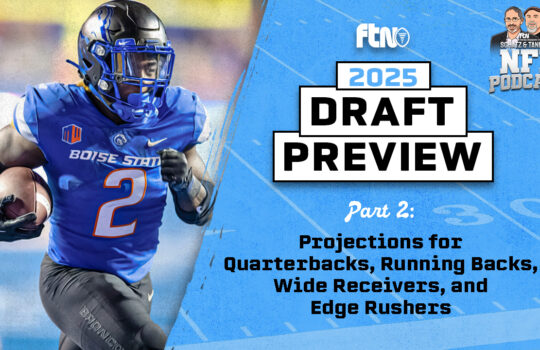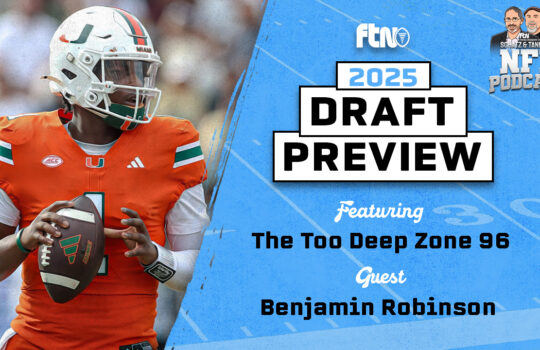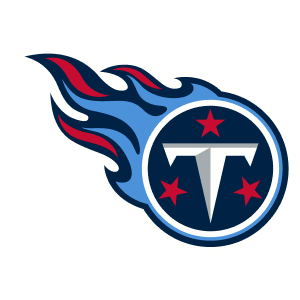
At the end of Week 17’s action, the Philadelphia Eagles are locked into the No. 2 seed, as both the Vikings and Lions pushed the bye week out of range. That makes their Week 18 game against the Giants technically meaningless, giving them the opportunity to rest key starters to prepare to play the Packers or Commanders in two weeks. A mini consolation bye, as it were – not as good as getting the first round of the playoffs off, but still a fitting reward for one of the top four teams in the league.
Normally, that’s where the intrigue for that game would end, if it wasn’t for Saquon Barkley’s great season. Barkley sits 101 yards short of Eric Dickerson’s single-season rushing record, putting Philadelphia in an awkward position – how much, if any, do you run Barkley out in a game that does not matter, just to break the record? How do you balance history with the risk of injury? It’d be one thing if he was 10 or 15 yards short, but 101 yards would mean Barkley (and his offensive linemen) would likely have to play a significant chunk of the game, which put Nick Sirianni and company in an awkward position. Ultimately, the Eagles decided to sit Barkley down, valuing rest over records.
The Raiders, meanwhile, already crossed their piece of history off the table. Brock Bowers broke Mike Ditka’s 63-year-old record for receiving yards by a rookie tight end this week. That record is so old that news coverage of the time had to explain what a “tight end” actually was, because the position had only been officially separated from “end” a few years earlier. From coverage here in Chicago, you would think that a national tragedy had just occurred, as sports talk radio mourned the passing of Ditka’s record with hushed tones and retrospectives. I suppose it gives them something else to talk about other than the flaming tire fire that has been Chicago’s season since mid-October.
One thing that all those Ditka pieces was quick to point out, of course, was that Bowers’ record shouldn’t really count – he took 16 games, while Ditka did it in a 14-game season! NBC Chicago said that “of course, a few different qualifiers” will be put on Bowers’ number, because of the expanded schedule. Yahoo! said that Bower’s record “comes with a caveat”. And MSN used the dreaded “asterisk” to describe Bowers’ achievement.
The same wording has been used to downplay Barkley’s achievement, as people feared he would play and break the record. Notably, that does not include Dickerson himself – despite reiterating that he really, really does not want Barkley to take his record away, his response to Barkley maybe doing it in 17 games rather than 16 was “hey, that’s football.” But Lane Johnson, Barkley’s own right tackle, noted that Barkley “has an extra game to do it. That’s a no-no.” And even Barkley himself, deferring to history, has pointed out that really, O.J. Simpson rushed for 2,000 yards in 14 games, so shouldn’t he have the record?
This all goes back to Ford Frick suggesting that Roger Maris passing Babe Ruth’s home run record in 1961 deserved some sort of “distinctive mark” because he did it in 162 games rather than 154. It was an idea that was roundly ignored at the time – MLB didn’t have an official record book at the time, no statisticians of the time used an asterisk, and after a few seasons, no one even bothered to list the 162- and 154-game records separately. And yet, the idea – spawned mostly because Frick was a close friend of Ruth’s and was annoyed the record was being beaten at all – has festered in sports discourse ever since. Every time someone approaches a mark that wasn’t achieved in precisely the same way it was in the past, someone will inevitably call for it to be in some way segregated out from the old achievement. We will never be freed of the Frickin’ Asterisk.
My stance on this, after long and careful deliberation, is simple: it does not matter. What Mike Ditka accomplished, or what Eric Dickerson or O.J Simpson did (…on the football field) will not be erased from history just because someone put up a bigger number. They’re not taking down any Hall of Fame plaques or Eternal Sunshining the memories of 1961, 1973 or 1984 out of our heads simply because someone new also did a good thing.
I get it. I really do. It’s easy to see a counting stat, note that one player had more opportunities to break it, and want to give credit to someone for doing it in a more compressed amount of time. That’s entirely fair, and that should come up. Ditka managing 1,076 yards in just 14 games as a rookie is an incredible feat, especially at a position that has not historically been kind to rookie performances. There have only been 23 other seasons where a tight end has topped that in any 14-game stretch, rookie or non-rookie, and half of those have happened in the past decade. Simpson averaged 143.1 rushing yards per game while playing every game in 1973 – that’s 10 more yards per game than anyone else in NFL history and nearly 20 more yards than Barkley’s 125.3. When talking about great single-season performances, bringing in the full context of those performances is important, and hitting marks faster than other players is absolutely relevant and fair.
But once you start putting caveats or qualifiers and asterisks on a statistical achievement, you open a Pandora’s Box. It’s not just length of season that affects the ease with which one can set a record, and just because it’s easiest to account for games played doesn’t mean that it’s even the most significant adjustment that needs to be made. And once you start marking players down for one thing, it’s not fair to stop there. Let’s get progressively more ridiculous, shall we?
Barkley has only carried the ball 345 times this season, giving him 5.8 yards per carry. It took Dickerson 379 carries to hit 2,105, so if Barkley had got his 100 yards in fewer than 34 carries this week, he would have done it in fewer carries than Dickerson took. It’s a counting stat, after all, and if doing something in fewer games is more impressive, surely doing something in fewer carries is also more impressive? We’re using the asterisk to adjust for games played, so let’s use, say, the percentage sign to adjust for carries.
Barkley and Dickerson ran into much lighter boxes than Simpson did. Simpson played in the 1970s, when defenses had caught and passed offenses and the game was stuck in the mud. Simpson’s 1973 Bills only threw the ball 213 times, and while that was an extremely low number even for the time, it’s indicative of the larger trends. In the decade leading up to the 1978 passing rules changes, teams ran the ball 34 times a game, compared to 26.6 times today and 30.9 times in Dickerson’s era. That’s a double-edged sword – more opportunities for yards, but less running against defenses expecting a pass. Clearly, Simpson and any other year before 1978 needs to have some sort of caveat, so let’s use, I don’t know, a plus sign.
And while we’re talking about workloads, hey, Barkley hasn’t exactly been pushing things to the limit this year! Because the Eagles have been so good, there have been four games where Barkley hasn’t had to have a carry in the fourth quarter. Had he been pushing for the record from the beginning and taken those garbage-time snaps, he would be much closer to Dickerson’s record – and possibly already past it. He’s averaging 6.6 yards per carry in fourth quarters, so that’s just 16 fourth-quarter carries away from being crowned champion. Kenneth Gainwell and Will Shipley have 39 fourth-quarter carries, so clearly, Barkley has just been too generous to take the record. We praised Barkley for wanting to let the young boys eat, and now that cost him the record? We’ll need some kind of mark for that, too; bust out the carat (^).
Barkley has the advantage of plenty of RPOs with a rushing quarterback distracting defenses; we’ll need a mark for that. Simpson’s record came before the 1974 tempo rules changes, when receivers could still cut block defenders and open up holes for him; we’ll need a mark for that. Dickerson set his record when the play clock was still at 30 seconds, not 40, so he had to take more carries when running out the clock, better put a mark there. And hey, while we’re at it, shouldn’t we adjust for the fact that the Eagles have played the easiest schedule in the league on offense by a significant margin? Maybe we need to add some sort of Defense-Adjusted signal…
We could go on and on like this, delving further and further into minutia to try to see who should be the true rushing champion, until we’ve split things so far that every single entry in the record book has a string of punctuation after it, like a comic strip character cursing up a storm. Every season is different to one another. Every rule change and strategic development and philosophical shift brings with it a new environment – sometimes making it easier to rack up a stat, sometimes making it harder. These are important factors to try to keep in mind when evaluating who is the best at something, but when it comes to just seeing who had the most of something? It gets ridiculous fast.
The real underlying root of the problem is people wanting to use “most counting stat” to equal “best,” and that’s just not a great way to do it – especially in football, one of the most complex and interconnected sports. Just because Bowers has the most receiving yards doesn’t necessarily mean he’s the best rookie tight end ever, just like Peyton Manning’s 2013 might not be the best passing season ever or Calvin Johnson’s 2012 might not be the best receiving season ever. They just have the biggest number. That goes for stats from the most simple to the most advanced – we can acknowledge that Brock Purdy led the league in passing DYAR last season and still vote for someone else to be MVP. That’s not a contradiction. That’s simply using our heads and our eyes and using numbers as the first step in understanding what’s going on, not the final determining factor of anything.
Whether Barkley finished with 2,005 yards or 2,106 or anywhere in between doesn’t fundamentally change that he’s had an amazing, fantastic season. Bowers’ rookie year wouldn’t be any less impressive if he had finished with 980 yards instead of going over 1,000. And if we can accept that single-season or single-game, or even career counting numbers aren’t a good way to determine the best season, game or career, then we can let go of this need to quantify and adjust and alter numbers to try to make sure that the person we want to be best is at the top of what is, at the end of the day, an arbitrary list. We can get rid of the asterisks and just be impressed that Bowers managed more yards than any other rookie tight end, or that Barkley threatened to have more rushing yards than anyone has ever managed before.
But if you’re a punctuation fan, don’t worry, I do have a suggestion for you. Take the asterisks, and the commas and the semicolons and the periods and the em-dashes and everything else, and then put a bunch of words between them. We try not to just publish big lists of numbers here and just let them float in the aether. That’s why we write columns and articles and almanacs trying to explain them and put them into greater context. Yes, it’s always fun to watch as a record comes close to falling, and we love a good statistical chase as much as the next guys – more so, possibly, because we’re so buried in spreadsheets for most of the year. But putting numbers into greater context is a key part of using them appropriately. A record – any record – is only as impressive as the story behind it.
We just passed the end of 2024, so Happy New Year to you all. If I can offer one resolution for you, it would be this – celebrate things for what they are, and don’t obsessively worry about making sure everything fits properly. Enjoy Bowers putting up massive yardage! Celebrate someone doing something that’s never been done before, and don’t obsess over how much it should ‘count’ compared to other people. Let’s try to move beyond the Frickin’ Asterisk and enjoy good football players doing good football things.


















































 New York Jets
New York Jets  New England Patriots
New England Patriots  Miami Dolphins
Miami Dolphins  Buffalo Bills
Buffalo Bills  Pittsburgh Steelers
Pittsburgh Steelers  Cleveland Browns
Cleveland Browns  Cincinnati Bengals
Cincinnati Bengals  Baltimore Ravens
Baltimore Ravens  Tennessee Titans
Tennessee Titans  Jacksonville Jaguars
Jacksonville Jaguars  Indianapolis Colts
Indianapolis Colts  Houston Texans
Houston Texans  Las Vegas Raiders
Las Vegas Raiders  Los Angeles Chargers
Los Angeles Chargers  Kansas City Chiefs
Kansas City Chiefs  Denver Broncos
Denver Broncos  Washington Commanders
Washington Commanders  Philadelphia Eagles
Philadelphia Eagles  New York Giants
New York Giants  Dallas Cowboys
Dallas Cowboys  Minnesota Vikings
Minnesota Vikings  Green Bay Packers
Green Bay Packers  Detroit Lions
Detroit Lions  Chicago Bears
Chicago Bears  Tampa Bay Buccaneers
Tampa Bay Buccaneers  New Orleans Saints
New Orleans Saints  Carolina Panthers
Carolina Panthers  Atlanta Falcons
Atlanta Falcons  San Francisco 49ers
San Francisco 49ers  Seattle Seahawks
Seattle Seahawks  Los Angeles Rams
Los Angeles Rams  Arizona Cardinals
Arizona Cardinals 








 Boston Celtics
Boston Celtics  Brooklyn Nets
Brooklyn Nets  Philadelphia 76ers
Philadelphia 76ers  New York Knicks
New York Knicks  Toronto Raptors
Toronto Raptors  Chicago Bulls
Chicago Bulls  Detroit Pistons
Detroit Pistons  Milwaukee Bucks
Milwaukee Bucks  Cleveland Cavaliers
Cleveland Cavaliers  Indiana Pacers
Indiana Pacers  Orlando Magic
Orlando Magic  Atlanta Hawks
Atlanta Hawks  Charlotte Hornets
Charlotte Hornets  Miami Heat
Miami Heat  Washington Wizards
Washington Wizards  Denver Nuggets
Denver Nuggets  Minnesota Timberwolves
Minnesota Timberwolves  Oklahoma City Thunder
Oklahoma City Thunder  Portland Trail Blazers
Portland Trail Blazers  Utah Jazz
Utah Jazz  LA Clippers
LA Clippers  Golden State Warriors
Golden State Warriors  Los Angeles Lakers
Los Angeles Lakers  Phoenix Suns
Phoenix Suns  Sacramento Kings
Sacramento Kings  Dallas Mavericks
Dallas Mavericks  Houston Rockets
Houston Rockets  Memphis Grizzlies
Memphis Grizzlies  New Orleans Pelicans
New Orleans Pelicans  San Antonio Spurs
San Antonio Spurs 












